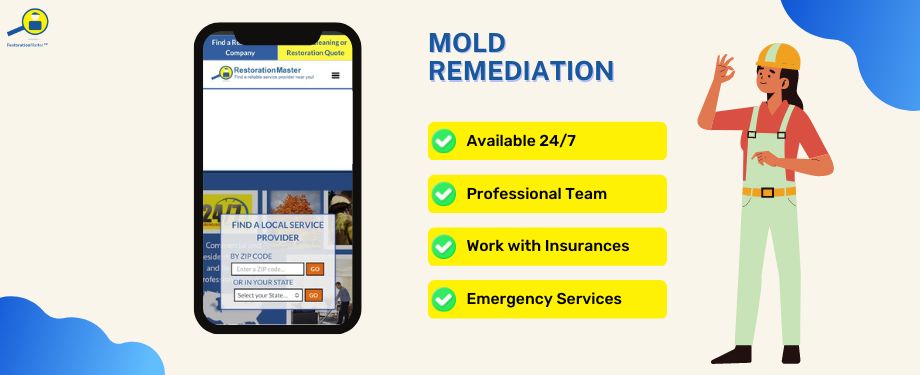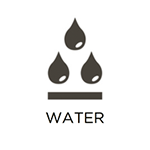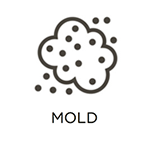RestorationMaster
Servicing Daytona Beach, Ormond Beach, Port Orange, Deltona and Volusia County, FL
When it comes to mold remediation in Daytona Beach, Ormond Beach, Port Orange, Deltona, and surrounding areas in Volusia County, FL, you can rely on your local RestorationMaster partner. Dealing with mold growth can be a challenging and potentially hazardous task, but with their expertise and experience, you can ensure a thorough and effective mold remediation process.
Mold is a common issue that many homeowners and property owners face, especially in areas with high humidity like Volusia County. It can thrive in moist environments, such as bathrooms, basements, and areas affected by water damage. Mold growth not only poses risks to the structural integrity of your property but also poses health hazards to occupants. Therefore, it is crucial to address mold problems promptly and professionally.
Mold Problem Facts
Mold growth inside a building is a serious issue that demands immediate attention. It is a common problem faced by both homeowners and business owners, as it can occur whenever there is a flood, slow leak, a broken pipe, or just high humidity. Once mold colonies become active and start growing, they can lead to chronic respiratory and sinus illnesses among the occupants of the building. If you observe discolored areas on the walls, ceiling, or carpet, it is a clear indication of a mold problem. Other warning signs that suggest mold is thriving in your indoor environment include a musty odor or a feeling of dampness in the air. The good news is that your local RestorationMaster partner in Daytona Beach, Ormond Beach, Port Orange, Deltona, and surrounding areas in Volusia County, FL, is just a phone call away, ready to provide professional mold remediation services.

If you experience a mold problem, call your local RestorationMaster partner in Daytona Beach, Ormond Beach, Port Orange, Deltona, and surrounding areas in Volusia County, FL at 386-267-4440.
Mold tends to grow in areas that have moisture or high humidity levels. Some common places where mold can develop include:
- Basements and crawl spaces: These areas are often prone to moisture buildup, especially if there are leaks or inadequate ventilation.
- Bathrooms and kitchens: The presence of water and steam in these areas can create a favorable environment for mold growth, especially if proper ventilation is lacking.
- Attics: Poor insulation or roof leaks can lead to moisture accumulation in attics, providing conditions suitable for mold growth.
- Plumbing areas: Leaky pipes, condensation, or water seepage around plumbing fixtures can create moisture issues that promote mold growth.
- Behind walls and under carpets: Water intrusion from leaks or flooding can penetrate walls and flooring, providing hidden moisture pockets where mold can flourish.
Mold grows due to the combination of moisture, a food source (organic materials such as wood, drywall, and fabrics), and favorable temperatures. Mold spores are present in the environment, and when these spores come into contact with a moist surface, they can begin to grow and multiply, forming colonies.
Your local RestorationMaster partner in Volusia County can assist in addressing mold-related issues in several ways:
- Inspection and Assessment: Restoration professionals can conduct a thorough inspection of the property to identify areas affected by mold growth. They use specialized equipment to detect hidden mold and determine the extent of the problem.
- Mold Remediation: RestorationMaster professionals can develop a comprehensive mold remediation plan tailored to your specific situation. This plan involves containing the mold, removing affected materials, and applying appropriate treatments to eliminate the mold colonies.
- Water Damage Restoration: If mold growth is a result of water damage, the restoration team can address the underlying issue by repairing leaks, drying out the affected areas, and restoring any damaged materials.
- Cleaning and Sanitization: Restoration professionals have the knowledge and equipment to properly clean and sanitize affected surfaces, preventing further mold growth and ensuring a safe environment.
- Prevention and Education: RestorationMaster experts can provide guidance on how to prevent future mold growth by addressing moisture sources, improving ventilation, and maintaining proper humidity levels. They can also educate you on mold prevention techniques and the importance of prompt action in addressing water damage issues.
By engaging the services of your local RestorationMaster partner in Volusia County, you can benefit from their expertise and specialized equipment to effectively mitigate mold growth, restore the affected areas, and create a healthier living environment.

The steps we follow in the mold remediation process:
Step 1: Responding to Your Call for Assistance
If you have concerns about mold, don’t hesitate to reach out to us at any time, 24/7, at 386-267-4440. Our dedicated customer service team will gather essential information by asking you a few questions to understand the type of mold you are dealing with and the extent of the resulting damage. Rest assured that we will swiftly assign a team of skilled professionals to handle your case as soon as possible.
Step 2: Conduct a Home Inspection and Evaluate the Extent of Damage
Upon contacting us, an operations manager will promptly arrive at your location to perform a comprehensive inspection of your home or business, meticulously searching for any signs of mold. Our inspection goes beyond the obvious areas and includes thorough examination of concealed spaces. Furthermore, we collect mold samples to determine the specific species present through third-party laboratory cultures.
Step 3: Implement Measures to Isolate and Control Existing Mold
Upon confirming the presence of mold, our initial priority is to prevent its dissemination throughout the residence or building. To achieve this, we take the following measures: disabling fans and air conditioning systems, and implementing the use of negative air chambers and other physical barriers to isolate the affected area. These strategies effectively confine the mold, facilitating a more streamlined and thorough elimination process.
Step 4: Purify the Air through Filtration
We employ HEPA filters and powerful vacuums to effectively cleanse your indoor air, eliminating contaminants and ensuring a pristine environment. This crucial step involves thorough air scrubbing to remove spores and deter the recurrence of mold. Our objective is to restore the airborne spore levels to those naturally found in the external surroundings. As a result of this process, customers often experience an immediate improvement in air quality and breathability.
Step 5: Perform Mold Removal and Dispose of Contaminated Building Materials
We take care of the necessary work of safely disposing of building materials like drywall, insulation, wallpaper, and carpeting that cannot be salvaged through extensive cleaning. For all other contaminated structures, we diligently apply antifungal and antimicrobial treatments to eliminate existing mold and inhibit the growth of new spores. This comprehensive approach ensures the thorough removal of mold and prevents its reestablishment, providing you with a reliable and long-term solution.
Step 6: Restore the Building to its Original State Prior to Mold Contamination
The concluding step entails the restoration phase, wherein we diligently install reliable building materials to replace the damaged ones. The scope of reconstruction varies based on the extent of the infestation, ranging from comprehensive room rebuilding to targeted replacements like drywall panels, wallpaper, or carpet sections. Our unwavering dedication ensures that we leave no trace of the previous mold infestation, striving for a seamless restoration that reinstates the integrity of your property.
Mold removal involves a comprehensive process, during which our technicians apply their understanding of the life cycle of specific mold species to prevent its recurrence. In addition to eliminating existing mold from surfaces and the air, we also thoroughly inspect your home for signs of water damage and excessive humidity levels. Since it is scientifically impractical to completely eradicate all spores from the air, our emphasis is on developing a strategy to restore spore levels to a natural and healthy state similar to outdoor air.
The Impacts of Mold on Health:
When it comes to the health of an individual, any substance inhaled into the lungs has the potential to exert an impact, particularly if it comprises microscopic particles that can be readily absorbed by the body. Mold spores, for instance, can obstruct airways and trigger allergic reactions, especially in individuals with sensitivities. It is noteworthy that Aspergillus, a prevalent mold species, is even capable of germinating inside human lungs. Moreover, certain types of mold possess the added detrimental characteristic of releasing mycotoxins, which are harmful chemicals exclusively produced by fungi. Fortunately, there is little credible evidence to support the rare claims of mold exposure causing pulmonary hemorrhage and memory loss.
Individuals exposed to mold have been reported to experience the following symptoms, as documented by the U.S. Centers for Disease Control and the Federal Emergency Management Agency:
- Skin irritation
- Fever
- Headaches
- General discomfort and body aches
- Asthma attacks in individuals with asthma
- Hypersensitivity pneumonitis in susceptible individuals
- Nasal congestion
- Breathing difficulties, such as wheezing or shortness of breath
- Frequent episodes of sneezing
- Nosebleeds
- Red and irritated eyes
For reliable mold remediation services in Volusia County, FL, reach out to your local RestorationMaster partner at (386)267-4440, available 24/7.
If you experience a mold problem, call your local RestorationMaster partner in Daytona Beach, Ormond Beach, Port Orange, Deltona, and surrounding areas in Volusia County, FL at 386-267-4440.
Answers to your Top Mold Questions:
Q: Does bleach kill mold?
A: While bleach can effectively kill mold on surfaces that are non-porous, such as tiles, bathtubs, and countertops, it may not be the most suitable solution for removing mold, particularly on porous materials like drywall or wood. The reason is that bleach might not penetrate deeply enough to eradicate the underlying mold. Moreover, bleach alone does not address the fundamental cause of mold growth, which is excess moisture. To prevent mold from recurring, it is crucial to address the moisture issue and ensure thorough drying of the affected area. For comprehensive and effective mold remediation, it is advisable to seek professional assistance or employ specialized mold removal products that are specifically formulated for this purpose.
Q: How long does it take for mold to grow after a water leak?
A: In a moist environment, mold can begin to grow within 24 to 48 hours. It’s important to understand that mold spores are constantly present in the air, so given the right conditions, including moisture and organic matter, mold can proliferate rapidly. Timely and proper handling of water leaks or moisture issues within the initial 24 to 48 hours minimizes the chances of mold formation. However, if an area remains damp or wet for an extended period, it creates an ideal breeding ground for mold spores to germinate and spread.
Q: How long does it take to remove mold from a property?
A: The time it takes to remove mold from a property can vary based on several factors, including the extent of mold growth, the size of the affected area, the types of materials involved, and the complexity of the remediation process. Mold removal can range from a few days for minor cases to several weeks for more severe afflictions. The specific circumstances of each situation will determine the duration of the mold removal process.
Related Services




